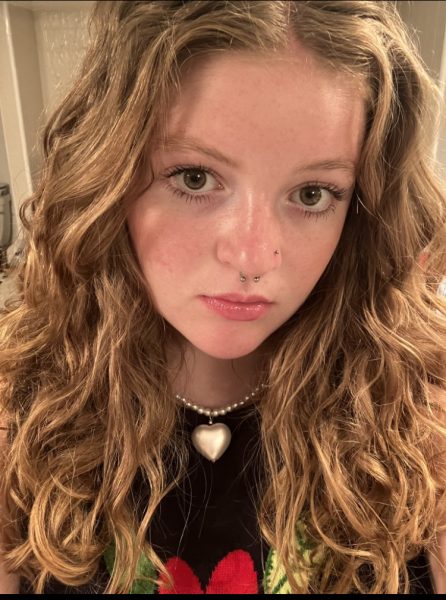Three weeks ago, the University of Utah wrapped the iconic Block U in the pride flag rather than sporting its signature Utah crimson red. The temporary change has come every year to celebrate the U’s pride week, the theme of which is “The Pride Renaissance” to highlight “the vibrancy of the LGBTQ+ community on and around our campus community.”
However, the same students who walk past the pride flag block U will also be greeted by transphobic posters on campus, displaying phrases such as, “No child is in the wrong body” and “Men can’t become women.” In the comments section of the U’s Instagram post about Pride Week, where the university showed off the temporarily pride-wrapped Block U, all the top comments are homophobic rhetoric.
“Is there a mental health course to get the LGBTQ students the right care and information instead of promoting this behavior and illness?” a comment from user kel_eeme said.
“Stop this. How foolish you [are to] celebrate how someone prefers to have sex,” another comment from user shaunie_lynn1 said.
In April, the U announced that this year will be the last the Block U is wrapped in the pride flag, ending a tradition that has gone on since 2021. With increasing homophobic rhetoric on campus and beyond, queer students need Pride Week now, more than ever.
Beyond Campus
This increase in queer hate does not occur in a vacuum. It is part of a wave of recent anti-queer rhetoric that has plagued the public psyche all year. It comes along with Utah’s anti-trans laws, threats to marriage equality and abortion rights as well as many recent losses of trans lives due to hate crimes. Participating in and platforming hate speech against vulnerable communities aligns with real-world violence.
Trans and gender-diverse individuals have an elevated overall mortality compared with cisgender people. This discrepancy increases when talking about deaths from external causes such as suicides and homicides.
The recent surge of homophobic laws and hate crimes caused The Human Rights Campaign to declare a national state of emergency for LGBTQ+ Americans in June 2023. The Human Rights Campaign cited over 75 anti-LGBTQ+ bills signed into law in 2023 alone. This more than doubled the amount signed in 2022, which HRC said was “previously the worst year on record.” The repercussions of this societal regression to conservative values have been felt on our campus.
Pinkwashing Genocide
On March 14, a room in the A. Ray Olpin Student Union served as a battleground for what has become a regular instance on campus within the past few months. Young Americans for Freedom at the University of Utah held a homophobic, hateful and highly advertised event and leftist student groups showed up to defend queer students. That day, YAF brought Palestine into their hate speech — a population currently fighting for their lives and liberation as they undergo a violent ethnic cleansing.
They did this by hosting conservative speaker Elisha Krauss, as she gave a talk titled “Gaza Hates Gays and Gals.” This reaction-baiting speech represents a textbook example of “pinkwashing.” Pinkwashing is an appropriation of pride and the support for queer rights to gather support for a different cause which often has opposing values to liberal queer rights movements.
It was also a shock factor speech, designed to prompt a strong emotional reaction from those who target others. On March 14, the U supported this weaponization of queer liberation and hate speech against the Palestinian people by hosting Elisha Krauss and giving YAF a room in the Student Union to hold this event.
Shame on You
On the day of the “Gaza Hates Gals and Gays” speaker, five giant letters constructed out of trans flags hung over YAF’s meeting room. They simply read, “SHAME.”
The Daily Utah Chronicle spoke with Emily Quinn, who created this counter-protest art installation. Quinn had previously protested YAF’s detransitioner event but changed her approach this time.
“I wrote a big essay, an open letter to YAF just to make my case as to why what they’re doing is upsetting. And extending an olive branch if [they] want to talk, let’s talk like normal people rather than hosting events to trivialize all this stuff,” she said, during the detransitioner event. “That didn’t work.”
Quinn added that comprehensive essays didn’t effectively call out YAF’s hate. Instead, her “SHAME” art piece called them out in an “unignorable” way.
“I turned it into one big headline, SHAME. Shame on you for doing this … for turning the genocide … the bombing of entire people … mass loss of life into smarmy identity politics,” she said
Quinn also says shame to the U’s empowerment of these hateful groups.
“Take a stance. Don’t shut down clubs that are trying to do something better. [Instead] shut down the clubs that are trying to make things worse for students on campus,” she said. “[The U] should actively say something rather than hide behind bureaucratic things … they should have some integrity.”
The U has claimed to hold a “politically neutral” stance on all issues.
“The university remains neutral on all election-related questions and issues and on political, social, or unsettled issues that do not directly relate to the university’s mission, role, or pedagogical objectives,” the U said in a January 2024 statement.
However, its actions have not aligned with these words. The U consistently supports the speech of the conservative group YAF while withdrawing its sponsorship of one of the campus’ largest leftist groups, Mecha.
Being politically neutral in the face of queer hate and genocide is unethical and impossible. In the words of pivotal civil rights activist Desmond Tutu, “If you are neutral in situations of injustice, you have chosen the side of the oppressor.”
When the U claims to foster a “politically neutral environment,” it is choosing the wrong side of history in every case. Hosting a lack of support for marginalized student groups while providing a platform for hate does not foster student success or safety.
With an increase in anti-queer attitudes on campus and beyond, Pride Week is essential. Every student, regardless of whether they identify as part of the LGBTQ+ community, has an ethical responsibility to make this threatened group feel safe and included on campus.
Choose to support the U’s expansive queer community beyond Pride Week. Show the U that you will not stand for hate towards the LGBTQ+ community.
Listen to Quinn’s provocative and supportive message and meet hate with shame.




